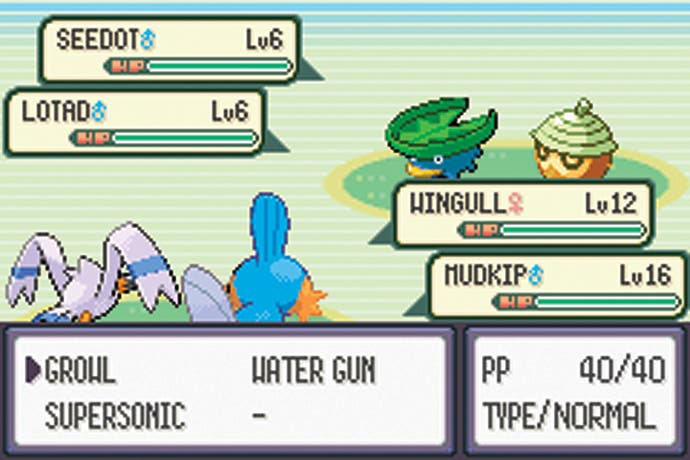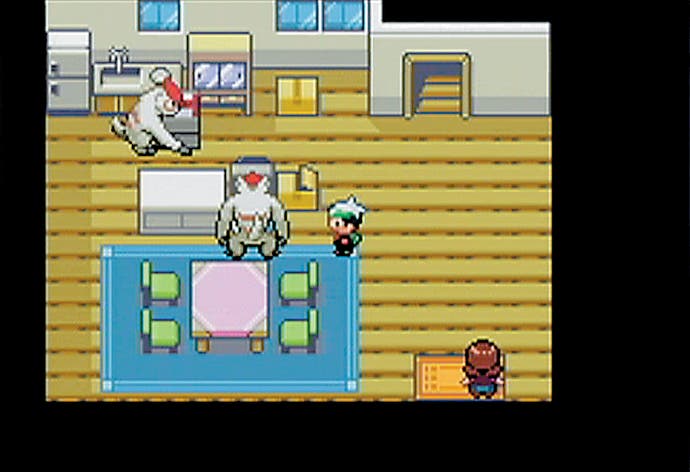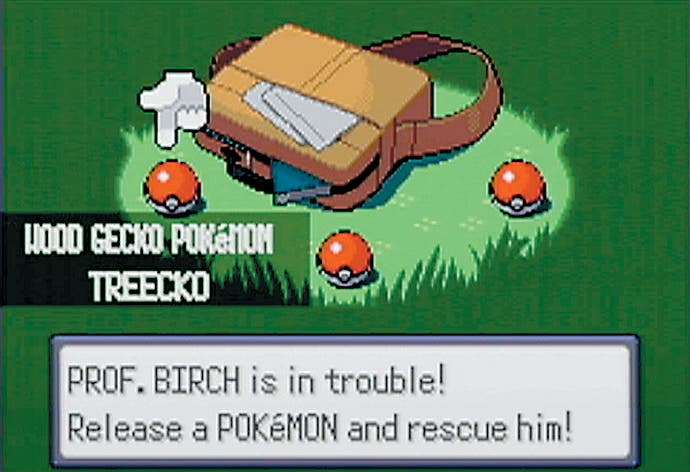Pok¨Śmon Emerald review
More green for Nintendo's coffers.
Another year, another Pokémon game springs out its red/white casing, fresh from Nintendo's loins. It shouldn’t be any surprise by now; Nintendo knows its market and despite the franchise flickering more in its embers than the full fledged flame of yesteryear, there's obviously still a demand. So here's the usual supply of role-playing, monster collecting, trading and poke/ball jokes. As is often the case with long-running and popular series like this, the question is not so much whether the game is any good but how quickly you're going to open up your Pokémon stitched wallets and plump down the cash for it. Hmph.
A good if predictable Poké
There's no denying the success of Pokémon is based on a very worthy formula, and much to a degree deserves its long running triumph. Nintendo has crafted a game that takes the more accessible elements of children's story narrative (relatable brave child entering a vast and unknown world of discovery), toy/card collecting (you find your Pokémon of varying abilities, train them into a fighting force for combat and trading), and RPGs (slow turn-based battles, and friendly townsfolk who don’t mind you rifling through their houses and taking their items). From these ingredients, Pokémon is cooked into something worth far more than the sum of its parts, if a little cookie cutter several years on from the original.
Emerald has the same level of insanely addictive collecting and battling where you catch the creatures and have them fight against other Pokémon in a selection of moves with a top trumps/rock-paper-scissors style stratagem. Poor choices, like selecting a fire elemental Pokémon against a water one, can quickly lose you fights. This is the backbone of the gameplay and it still works wonderfully, as does the ultimate choice of whether to capture or finish off a wild Pokémon when they reach their final vestiges of health; risking a missed imprisonment and prolonged brawl should you fail to get your target. The rarer the beastie, the harder and riskier it is. Obvious, yet well balanced.
Layered on top of that is the upgrade system and expansion of your little pets, which sees them grow, adapt and evolve under your tutelage. Some Pokémon can be given special abilities by items, others gain them from experience won in fracas. They become unique to you and thus the true genius of Pokémon pops out and traps you with its compulsion. Within an hour of the game, you're hunting down rare beasts, affectionately giving them silly names, and crushing all-comers, whether those are CPU trainers from the story or link-up/wireless human players. It's fun and addictive. It's also inevitably samey and flawed...

A spoonful of sugar helps the medicine go down
We can almost hear the rusty pitchforks being sharpened now. But wait. Hold on. Allow an explanation. Pokémon itself, as a conceptual game, is executed excellently. It looks lovely, with colourful, well defined sprites that leap out with crispness, especially on the DS' screen. There are some great incidental effects too, like your character leaving footprints in the sand and reflections in pools or water. Likewise, the audio does a good job of conveying a cheery Saturday morning TV atmosphere, as does the story; which isn't anything too far beyond a fun rites of passage romp complete with run-ins against Pokémon gym trainers and feisty teams Aqua and Magma.
There's plenty within Emerald to even keep you busy beyond the basics of the game. Sub-quests and challenges are abundant, you can import your creatures into Pokémon Dash (and Pokémon Colosseum with a GameCube link cable too) and the fun multiplayer battles reach up to four players.
As we said, it's a package that hangs together extremely well for the 30 plus hours it takes to explore most of its delights.

Green around the gills
But. The well woven craft that is Pokémon Emerald unravels under a harsh but ever-present reality: it's essentially the same game as before. Again. With the even more cynical twist that it's not so much a half changed update, which would be mildly plausible, but more of a director's cut of the previously released Pokémon Ruby and Sapphire. It looks better, is a little harder and longer, there are various improvements to the interfaces and there are a few new areas to explore (some only after you beat the game), but there's no getting away from the fact that if you've blitzed through Ruby or Sapphire a comparative majority of Emerald is going to be like experiencing déjà vu all over again. And again. And again. It's the Groundhog day of gaming.
This isn’t the first time Nintendo has done this, given it employed the same tactic with Pokémon Gold and Silver, which saw a remixed edition of the two in the singular shape of Pokémon Crystal. None of which would be a problem if the games from their conception to now -that's over seven years of history- weren’t so dangerously similar.
The greatest strength of Pokémon Emerald is its greatest weakness: familiarity. And this familiarity started to breed contempt the last time. We understand it’s a classic formula that's never really going to change in risk of alienating its dedicated supporters. Safe it may be, but there's nothing here to convince those who've not tried Pokémon before to pick it up now. The fanbase remains static with enough buying to provide ample coin - but that coin is the same £20 plus you've had to shell out each time, as with the last games.

*Reviewer has fainted*
The stagnant character of the franchise shouldn’t shock anyone. That's the nature of the market, and cleverly that's the ethos Nintendo has inspired not only as a gameplay ethic but as a commercial one too. Gotta catch 'em all. So it's likely Pokémon addicts will buy this regardless, making the review redundant. At the same time, Emerald cannibalises enough of its brethren to make it one of the better, more rounded examples of its type which alternatively makes it easy to recommend as great entry for those new to Pokémon.
This leaves a distinct quandary on our hands regarding the score. Pokémon Emerald is a very enjoyable game. Yet Pokémon Emerald is a very cynical game. It's disarming in its unpretentious charm, yet aimed at an audience that will feel the need to buy it. This despite it being essentially a 'patch' if it were released on the PC, for the price of a new product in its respective market. All this is taken in account for the final score, because, let's face it, if you want to collect all the Pokémon games; it doesn’t really matter anyway. And if you didn't care for Pokémon before, this is not going to convince you to change your religion either. But if you're one of the slightly unsure fans looking for another hit of the series -recycled parts be damned-, or just trying for your first time, add a good two marks to that little number at the bottom of the page. There. Simple.
There's no getting away from the slight that Pokémon Emerald is still a contemptuous exercise in bleeding a viable franchise dry, and because it doesn’t offer anything vastly new it was always unlikely to earn nothing greater than its predecessors on a critical scale. Business as usual in every sense, then. It's still as palatable, charmingly inoffensive and playable as it's ever been. As always, the game is punished or rewarded by how many of you rush out and buy it to satisfy their Poke-craving, rather than the rating we give it. It's almost a straw-man argument, really, because underneath this all is simple, irrefutable business. Supply, demand.
It just would be nice for Nintendo and Game Freak to supply the other demand next time: the demand of something actually more different, or at least palpably new, for our hard earned. Let the pitchfork laden debate begin.

